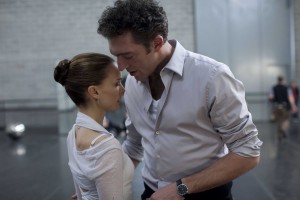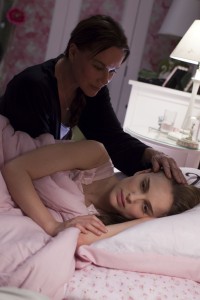Black Swan vs. Black Swan: Revisionist History Vol. 2, A Screener’s Revenge
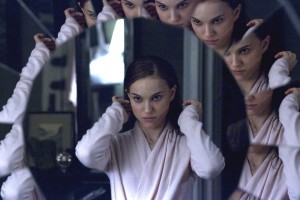 As a critic, my job is to be as objective as possible while acknowledging my own subjectivity. But what rarely comes into play, at least consciously, is whatever mood I might be in on the way into the theater. I saw Black Swan at the opening night of the Philadelphia Film Festival on October 14th. There was a non-festival screening of Jackass 3-D that was scheduled 2 hours later at a theater about ten minutes away. Black Swan runs about 1 hour and 45 minutes, pre-credits, and as you might imagine, an opening night film is never going to start exactly on time, especially after the two special events announced at the last moment. First, since it was opening the festival it had to be locally relevant (such as last year’s opener, Law Abiding Citizen), so they invited the ballet dancers who helped out and performed in the film, made up of members of the Pennsylvania Ballet. Not that you’d notice one or way or the other, because Black Swan takes place in Manhattan, with the dancing occurring at Lincoln Center. The other last minute announcement was that Black Swan director Darren Aronofsky would be doing a post-film Q+A.
As a critic, my job is to be as objective as possible while acknowledging my own subjectivity. But what rarely comes into play, at least consciously, is whatever mood I might be in on the way into the theater. I saw Black Swan at the opening night of the Philadelphia Film Festival on October 14th. There was a non-festival screening of Jackass 3-D that was scheduled 2 hours later at a theater about ten minutes away. Black Swan runs about 1 hour and 45 minutes, pre-credits, and as you might imagine, an opening night film is never going to start exactly on time, especially after the two special events announced at the last moment. First, since it was opening the festival it had to be locally relevant (such as last year’s opener, Law Abiding Citizen), so they invited the ballet dancers who helped out and performed in the film, made up of members of the Pennsylvania Ballet. Not that you’d notice one or way or the other, because Black Swan takes place in Manhattan, with the dancing occurring at Lincoln Center. The other last minute announcement was that Black Swan director Darren Aronofsky would be doing a post-film Q+A.
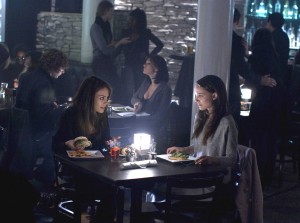 Obviously, these events would make it very difficult to make it to Jackass 3-D on time. Now, I’m a not-so-closeted-fan of the Jackass series, the first two films offer a very pure view of homoerotic idiocy, combined with a surrealist touch (tropical pole vaulting!) no doubt aided by Spike Jonze’s position as a producer. And neither of those first two films were screened for critics, so the fact that I’d get to see the third film in the theater, and in wonderfully unnecessary 3-D at that*, made me more excited than going to see Black Swan. And it also made me anxious and impatient, knowing I’d have to start running as soon as the movie was over, which should have been perfect for Black Swan, considering it’s already trying to make you feel that way. But it didn’t, I was bored and thought it was incredibly hokey, as you can read below in the review that appeared in a slightly abbreviated form in the December 9th editions of the Germantown Chronicle and the Mount Airy Independent.
Obviously, these events would make it very difficult to make it to Jackass 3-D on time. Now, I’m a not-so-closeted-fan of the Jackass series, the first two films offer a very pure view of homoerotic idiocy, combined with a surrealist touch (tropical pole vaulting!) no doubt aided by Spike Jonze’s position as a producer. And neither of those first two films were screened for critics, so the fact that I’d get to see the third film in the theater, and in wonderfully unnecessary 3-D at that*, made me more excited than going to see Black Swan. And it also made me anxious and impatient, knowing I’d have to start running as soon as the movie was over, which should have been perfect for Black Swan, considering it’s already trying to make you feel that way. But it didn’t, I was bored and thought it was incredibly hokey, as you can read below in the review that appeared in a slightly abbreviated form in the December 9th editions of the Germantown Chronicle and the Mount Airy Independent.
However, I was offered a unique opportunity, since it is Academy screener time, and as a member of the OFCS, I was sent a copy of Black Swan on DVD. At first, I was just fact-checking something in my review, after it had already been submitted, to see if I needed to send a correction to my editor. But I was quickly sucked in and ended up watching the entire film for a second time and had a totally different reaction. I’m not suggesting that anyone who goes to see Black Swan should bring their laptop and only occasionally look up at the screen. Regardless, I’m going to let you read my initial reaction below and then I will discuss the second viewing after that.
If it’s true that there are no new stories to tell, then all you can do is tell the same stories in a new way. Sure, all fiction is derivative of something, and the various influences are what build the particular point-of-view that distinguishes the material. Those who are accused of being rip-off artists simply haven’t waited long enough to the point where stealing turns into inspiration and homage. A true hack is simply trying to cash-in on a popular trend with no intent of differentiation, and has no artistic integrity to worry about.
A movie like Roland Joffe’s 2007 film Captivity, with Elisha Cuthbert playing a starlet who has been drugged, kidnapped, and isolated in a strange, dark room, has no interest in being anything other than a stylistic and tonally identical movie to Saw, from the color schemes to the story structure, and everything else on down. Joffe is counting on the viewer’s inability to distinguish between his film and Saw, he’s even hoping it happens, co-opting Saw fans who will no doubt be disappointed after they’ve been bilked out of their money.
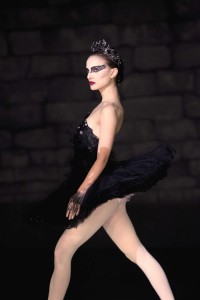 Darren Aronofsky’s Black Swan has had enough time and distance from its more obvious influences like Repulsion and All About Eve as to appear to be its own creature, indebted only to our expectations. Primarily, Black Swan is a thriller about a ballerina played by Natalie Portman who badly wants to be the lead in a Lincoln Center production of Swan Lake, but can’t convince anyone that she has the edge and exuberance to play both the Black and White Swan, while she simultaneously deals with her own progressive insanity. Aronofsky’s approach is to combine the mundane with the surreal and hope we’ll get caught in the middle. Portman’s character, who lives with her domineering mother (Barbara Hershey), is miserable at the beginning of the film and she’s not happier as she rises to the top, so Aronofsky has Black Swan prey on her vulnerability and isolation. The camera is always by everyone’s ear, which is initially disorienting but eventually reveals the truth of what’s going on; Black Swan is incredibly, amazingly, astoundingly… threadbare and silly.
Darren Aronofsky’s Black Swan has had enough time and distance from its more obvious influences like Repulsion and All About Eve as to appear to be its own creature, indebted only to our expectations. Primarily, Black Swan is a thriller about a ballerina played by Natalie Portman who badly wants to be the lead in a Lincoln Center production of Swan Lake, but can’t convince anyone that she has the edge and exuberance to play both the Black and White Swan, while she simultaneously deals with her own progressive insanity. Aronofsky’s approach is to combine the mundane with the surreal and hope we’ll get caught in the middle. Portman’s character, who lives with her domineering mother (Barbara Hershey), is miserable at the beginning of the film and she’s not happier as she rises to the top, so Aronofsky has Black Swan prey on her vulnerability and isolation. The camera is always by everyone’s ear, which is initially disorienting but eventually reveals the truth of what’s going on; Black Swan is incredibly, amazingly, astoundingly… threadbare and silly.
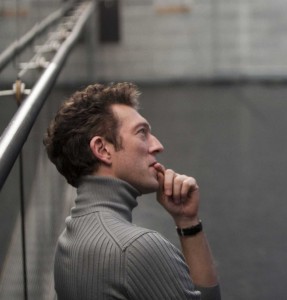 Did you know that ballet dancers are fragile, pale, and skinny? Did you know they had ambitions to rise to the top, and they’ll try to sleep with the artistic director of a production to get a lead part? Can you imagine an artistic director who takes advantage of his position and assigns parts based on who’s next outside his bedroom door? [And how about Vincent Cassel as the artistic director, complete with his Carl Sagan turtleneck/sweater vests?] Sure, Aronofsky (Requiem For a Dream, The Wrestler) is an important filmmaker with his own important style and his own important opinion to express. And wouldn’t it be neat if he took something as highbrow as ballet and turned it into a naughty exploitation film? But no matter how many cheesy hallucinations about being stalked and followed by those who are out to get here or extraneous lesbian sex scenes he throws in, it’s clear he didn’t have the heart to go all out, and Black Swan never rises to the level of exploitation.
Did you know that ballet dancers are fragile, pale, and skinny? Did you know they had ambitions to rise to the top, and they’ll try to sleep with the artistic director of a production to get a lead part? Can you imagine an artistic director who takes advantage of his position and assigns parts based on who’s next outside his bedroom door? [And how about Vincent Cassel as the artistic director, complete with his Carl Sagan turtleneck/sweater vests?] Sure, Aronofsky (Requiem For a Dream, The Wrestler) is an important filmmaker with his own important style and his own important opinion to express. And wouldn’t it be neat if he took something as highbrow as ballet and turned it into a naughty exploitation film? But no matter how many cheesy hallucinations about being stalked and followed by those who are out to get here or extraneous lesbian sex scenes he throws in, it’s clear he didn’t have the heart to go all out, and Black Swan never rises to the level of exploitation.
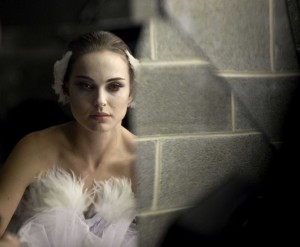 The movie falls under the same unfortunate tree as Stanley Kubrick’s adaptation of The Shining. Now I know that The Shining is a sacred cow of sorts, but it’s a monumentally obvious and dopey movie. Jack Torrance is clearly crazy in the first five minutes and we spend the next 140 minutes of fancy camerawork and shock cuts finding out that… he’s clearly crazy. Black Swan is The Shining in a tutu. Both films should have embraced their stories of non-progression and turned into full-on camp, but no such luck. And if anything, Black Swan owes more to Jacob’s Ladder with its combination of clichéd horror imagery about demons on the streets of NY, in the subway, and at home. But Black Swan doesn’t have the anything goes feel of Jacob’s Ladder (even though you could trade out Ladder’s Vietnam for Swan’s ballet, and you’d have practically the same movie), it’s a lot drearier. The pared down photography that Aronofsky adopted for The Wrestler (at odds with the visually frenetic The Fountain and Requiem For a Dream) doesn’t suit Black Swan, which begins to resemble an early 80s TV movie at times, or like a dated “we’re-dealing-with-serious-issues here, even though this is just a pretty sleazy but half-hearted studio movie” like Lipstick (starring the Hemingway sisters).
The movie falls under the same unfortunate tree as Stanley Kubrick’s adaptation of The Shining. Now I know that The Shining is a sacred cow of sorts, but it’s a monumentally obvious and dopey movie. Jack Torrance is clearly crazy in the first five minutes and we spend the next 140 minutes of fancy camerawork and shock cuts finding out that… he’s clearly crazy. Black Swan is The Shining in a tutu. Both films should have embraced their stories of non-progression and turned into full-on camp, but no such luck. And if anything, Black Swan owes more to Jacob’s Ladder with its combination of clichéd horror imagery about demons on the streets of NY, in the subway, and at home. But Black Swan doesn’t have the anything goes feel of Jacob’s Ladder (even though you could trade out Ladder’s Vietnam for Swan’s ballet, and you’d have practically the same movie), it’s a lot drearier. The pared down photography that Aronofsky adopted for The Wrestler (at odds with the visually frenetic The Fountain and Requiem For a Dream) doesn’t suit Black Swan, which begins to resemble an early 80s TV movie at times, or like a dated “we’re-dealing-with-serious-issues here, even though this is just a pretty sleazy but half-hearted studio movie” like Lipstick (starring the Hemingway sisters).
And all that might be okay if Aronofsky had any insight into ballet that extended beyond standard backstage melodrama and backstabbing or if we truly cared or could sympathize with or might find Portman even remotely interesting. But her performance is all anorexic anxiousness, which was probably the point, but was so off-putting that all I could think of as the solution to her myriad problems was to offer her a sandwich.
You’d think that watching a movie at home, half-distracted and browsing the internet, and theoretically scanning the movie for specific information, would be the worst way to watch a movie like Black Swan. Was it my low expectations that caused me to respond to it? Was the anxious mood I was in for the first viewing wrong for the occasion? Perhaps that’s the problem, because Aronofsky’s film had no way of emotionally swaying me if I was already in that particular state. So, at first, Black Swan played like a barely-thought through thriller which faltered due to the overtly serious tone and self-importance for what is not much of a story. And the humor and goofiness felt unintentional, especially the amount of time trying to scare us with loud noises and visual misdirection.
But I don’t think my criticisms above are entirely invalid; I still don’t think the camerawork is all that effective, but the Jacob’s Ladder references are much more insignificant than they felt initially, and the humor works much better because the film is deliberately all over the place**. It especially adds to the Mila Kunis character, who seemed like just a plot conduit for Portman to do drugs and have sexual fantasies about. She has the best line of the film, asking Portman about her sex dream, “was I good?”
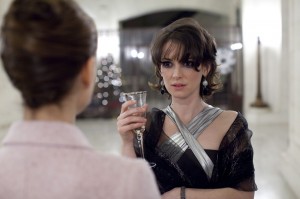 Vincent Cassel’s character doesn’t come off nearly as badly as he did at first; he’s more of a misguided pompous fool than an underwritten bore with unfortunate fashion choices. His character is more washed-up than even Winona Ryder’s aging dancer, who still makes the most impression in her brief screen time. Barbara Hershey’s role as Portman’s “jealous” mother, a failed dancer herself, is only slightly improved by knowing the outcome of the film, but what was striking was her uncanny visual similarity to Portman. If, in the future, I learn that some of this was accomplished through CGI adjustments to Hershey’s face (as opposed to her already notorious surgical adjustments), I would not be surprised. It also adds a level of tension to the previously hammy mirror sequences, where Portman sees her reflection and watches as it tries to attack her.
Vincent Cassel’s character doesn’t come off nearly as badly as he did at first; he’s more of a misguided pompous fool than an underwritten bore with unfortunate fashion choices. His character is more washed-up than even Winona Ryder’s aging dancer, who still makes the most impression in her brief screen time. Barbara Hershey’s role as Portman’s “jealous” mother, a failed dancer herself, is only slightly improved by knowing the outcome of the film, but what was striking was her uncanny visual similarity to Portman. If, in the future, I learn that some of this was accomplished through CGI adjustments to Hershey’s face (as opposed to her already notorious surgical adjustments), I would not be surprised. It also adds a level of tension to the previously hammy mirror sequences, where Portman sees her reflection and watches as it tries to attack her.
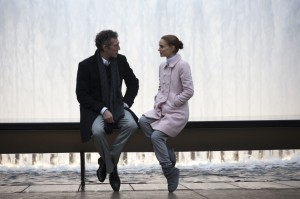 Does all this mean that I’ve completely changed my mind and regret what I wrote about the film? No, but I certainly had a nearly polar opposite reaction, quite appropriate considering the dual nature and content of the film. Indeed, Portman’s performance, which I noted above was anxiously anorexic, is slightly more subtle than that, especially with regards to her repression, she’s holding back her happiness because she thinks that she shouldn’t show her mother anything but a professional demeanor. The smiles she offers in the first few minutes evaporate for the rest of the movie; she even looks uncomfortable when she’s given the lead part in the ballet. I think we can all relate to the discomfort we go through trying to appear stoic to our parents, as if showing pleasure would be somehow cheating and acknowledging them as our friends who only want to see us happy.
Does all this mean that I’ve completely changed my mind and regret what I wrote about the film? No, but I certainly had a nearly polar opposite reaction, quite appropriate considering the dual nature and content of the film. Indeed, Portman’s performance, which I noted above was anxiously anorexic, is slightly more subtle than that, especially with regards to her repression, she’s holding back her happiness because she thinks that she shouldn’t show her mother anything but a professional demeanor. The smiles she offers in the first few minutes evaporate for the rest of the movie; she even looks uncomfortable when she’s given the lead part in the ballet. I think we can all relate to the discomfort we go through trying to appear stoic to our parents, as if showing pleasure would be somehow cheating and acknowledging them as our friends who only want to see us happy.
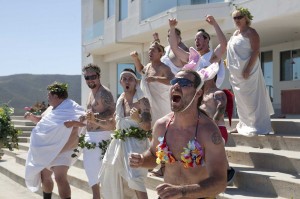 * I didn’t write a review of Jackass 3-D because it’s essentially unreviewable. Either the gags work or they don’t. I thought the 3-D worked better than you’d imagine (though the presentation we received was wholly flawed and heavily cropped, so the film couldn’t be judged fairly), but a lot of the stunts were repetitive and there were only a few that were truly memorable. These included the opening and closing sequences shot on film (as opposed to the DV used for the “documentary” portions of the movie), beehive tetherball, the repeated references to The Terror of Tiny Town (an all-midget western), and a moment where a terrified Steve-O, anticipating the pain he’s about to experience, weighing it with his lofty reputation and regretfully uttering, “why’d I have to be Steve-O?!” Also, it’s clear from the third film that the real movie star who should emerge from the trilogy is not Johnny Knoxville, but the downright charming Chris Pontius, who is loaded with screen presence. I was glad to see that he has a small role in Sofia Coppola’s new film Somewhere.
* I didn’t write a review of Jackass 3-D because it’s essentially unreviewable. Either the gags work or they don’t. I thought the 3-D worked better than you’d imagine (though the presentation we received was wholly flawed and heavily cropped, so the film couldn’t be judged fairly), but a lot of the stunts were repetitive and there were only a few that were truly memorable. These included the opening and closing sequences shot on film (as opposed to the DV used for the “documentary” portions of the movie), beehive tetherball, the repeated references to The Terror of Tiny Town (an all-midget western), and a moment where a terrified Steve-O, anticipating the pain he’s about to experience, weighing it with his lofty reputation and regretfully uttering, “why’d I have to be Steve-O?!” Also, it’s clear from the third film that the real movie star who should emerge from the trilogy is not Johnny Knoxville, but the downright charming Chris Pontius, who is loaded with screen presence. I was glad to see that he has a small role in Sofia Coppola’s new film Somewhere.
I did start an article about Jackass and Louis CK’s fantastic concert film Hilarious, called “The Unreviewables,” but realized not long in that it was not about the films themselves, but rather about how hard it is to write about them, which is too self-indulgent, even for me.
** This includes the various laughs that the rubber-costumed black demon gets (the suitor for The Black Swan) as he tries his hardest not to acknowledge how much he looks like a darkly spray-painted version of The Toxic Avenger.
 Obviously, these events would make it very difficult to make it to Jackass 3-D on time. Now, I’m a not-so-closeted-fan of the Jackass series, the first two films offer a very pure view of homoerotic idiocy, combined with a surrealist touch (tropical pole vaulting!) no doubt aided by Spike Jonze’s position as a producer. And neither of those first two films were screened for critics, so the fact that I’d get to see the third film in the theater, and in wonderfully unnecessary 3-D at that*, made me more excited than going to see Black Swan. And it also made me anxious and impatient, knowing I’d have to start running as soon as the movie was over, which should have been perfect for Black Swan, considering it’s already trying to make you feel that way. But it didn’t, I was bored and thought it was incredibly hokey, as you can read below in the review that appeared in a slightly abbreviated form in the December 9th editions of the Germantown Chronicle and the Mount Airy Independent.
Obviously, these events would make it very difficult to make it to Jackass 3-D on time. Now, I’m a not-so-closeted-fan of the Jackass series, the first two films offer a very pure view of homoerotic idiocy, combined with a surrealist touch (tropical pole vaulting!) no doubt aided by Spike Jonze’s position as a producer. And neither of those first two films were screened for critics, so the fact that I’d get to see the third film in the theater, and in wonderfully unnecessary 3-D at that*, made me more excited than going to see Black Swan. And it also made me anxious and impatient, knowing I’d have to start running as soon as the movie was over, which should have been perfect for Black Swan, considering it’s already trying to make you feel that way. But it didn’t, I was bored and thought it was incredibly hokey, as you can read below in the review that appeared in a slightly abbreviated form in the December 9th editions of the Germantown Chronicle and the Mount Airy Independent.
However, I was offered a unique opportunity, since it is Academy screener time, and as a member of the OFCS, I was sent a copy of Black Swan on DVD. At first, I was just fact-checking something in my review, after it had already been submitted, to see if I needed to send a correction to my editor. But I was quickly sucked in and ended up watching the entire film for a second time and had a totally different reaction. I’m not suggesting that anyone who goes to see Black Swan should bring their laptop and only occasionally look up at the screen. Regardless, I’m going to let you read my initial reaction below and then I will discuss the second viewing after that.
If it’s true that there are no new stories to tell, then all you can do is tell the same stories in a new way. Sure, all fiction is derivative of something, and the various influences are what build the particular point-of-view that distinguishes the material. Those who are accused of being rip-off artists simply haven’t waited long enough to the point where stealing turns into inspiration and homage. A true hack is simply trying to cash-in on a popular trend with no intent of differentiation, and has no artistic integrity to worry about.
A movie like Roland Joffe’s 2007 film Captivity, with Elisha Cuthbert playing a starlet who has been drugged, kidnapped, and isolated in a strange, dark room, has no interest in being anything other than a stylistic and tonally identical movie to Saw, from the color schemes to the story structure, and everything else on down. Joffe is counting on the viewer’s inability to distinguish between his film and Saw, he’s even hoping it happens, co-opting Saw fans who will no doubt be disappointed after they’ve been bilked out of their money.
 Darren Aronofsky’s Black Swan has had enough time and distance from its more obvious influences like Repulsion and All About Eve as to appear to be its own creature, indebted only to our expectations. Primarily, Black Swan is a thriller about a ballerina played by Natalie Portman who badly wants to be the lead in a Lincoln Center production of Swan Lake, but can’t convince anyone that she has the edge and exuberance to play both the Black and White Swan, while she simultaneously deals with her own progressive insanity. Aronofsky’s approach is to combine the mundane with the surreal and hope we’ll get caught in the middle. Portman’s character, who lives with her domineering mother (Barbara Hershey), is miserable at the beginning of the film and she’s not happier as she rises to the top, so Aronofsky has Black Swan prey on her vulnerability and isolation. The camera is always by everyone’s ear, which is initially disorienting but eventually reveals the truth of what’s going on; Black Swan is incredibly, amazingly, astoundingly… threadbare and silly.
Darren Aronofsky’s Black Swan has had enough time and distance from its more obvious influences like Repulsion and All About Eve as to appear to be its own creature, indebted only to our expectations. Primarily, Black Swan is a thriller about a ballerina played by Natalie Portman who badly wants to be the lead in a Lincoln Center production of Swan Lake, but can’t convince anyone that she has the edge and exuberance to play both the Black and White Swan, while she simultaneously deals with her own progressive insanity. Aronofsky’s approach is to combine the mundane with the surreal and hope we’ll get caught in the middle. Portman’s character, who lives with her domineering mother (Barbara Hershey), is miserable at the beginning of the film and she’s not happier as she rises to the top, so Aronofsky has Black Swan prey on her vulnerability and isolation. The camera is always by everyone’s ear, which is initially disorienting but eventually reveals the truth of what’s going on; Black Swan is incredibly, amazingly, astoundingly… threadbare and silly.
 Did you know that ballet dancers are fragile, pale, and skinny? Did you know they had ambitions to rise to the top, and they’ll try to sleep with the artistic director of a production to get a lead part? Can you imagine an artistic director who takes advantage of his position and assigns parts based on who’s next outside his bedroom door? [And how about Vincent Cassel as the artistic director, complete with his Carl Sagan turtleneck/sweater vests?] Sure, Aronofsky (Requiem For a Dream, The Wrestler) is an important filmmaker with his own important style and his own important opinion to express. And wouldn’t it be neat if he took something as highbrow as ballet and turned it into a naughty exploitation film? But no matter how many cheesy hallucinations about being stalked and followed by those who are out to get here or extraneous lesbian sex scenes he throws in, it’s clear he didn’t have the heart to go all out, and Black Swan never rises to the level of exploitation.
Did you know that ballet dancers are fragile, pale, and skinny? Did you know they had ambitions to rise to the top, and they’ll try to sleep with the artistic director of a production to get a lead part? Can you imagine an artistic director who takes advantage of his position and assigns parts based on who’s next outside his bedroom door? [And how about Vincent Cassel as the artistic director, complete with his Carl Sagan turtleneck/sweater vests?] Sure, Aronofsky (Requiem For a Dream, The Wrestler) is an important filmmaker with his own important style and his own important opinion to express. And wouldn’t it be neat if he took something as highbrow as ballet and turned it into a naughty exploitation film? But no matter how many cheesy hallucinations about being stalked and followed by those who are out to get here or extraneous lesbian sex scenes he throws in, it’s clear he didn’t have the heart to go all out, and Black Swan never rises to the level of exploitation.
 The movie falls under the same unfortunate tree as Stanley Kubrick’s adaptation of The Shining. Now I know that The Shining is a sacred cow of sorts, but it’s a monumentally obvious and dopey movie. Jack Torrance is clearly crazy in the first five minutes and we spend the next 140 minutes of fancy camerawork and shock cuts finding out that… he’s clearly crazy. Black Swan is The Shining in a tutu. Both films should have embraced their stories of non-progression and turned into full-on camp, but no such luck. And if anything, Black Swan owes more to Jacob’s Ladder with its combination of clichéd horror imagery about demons on the streets of NY, in the subway, and at home. But Black Swan doesn’t have the anything goes feel of Jacob’s Ladder (even though you could trade out Ladder’s Vietnam for Swan’s ballet, and you’d have practically the same movie), it’s a lot drearier. The pared down photography that Aronofsky adopted for The Wrestler (at odds with the visually frenetic The Fountain and Requiem For a Dream) doesn’t suit Black Swan, which begins to resemble an early 80s TV movie at times, or like a dated “we’re-dealing-with-serious-issues here, even though this is just a pretty sleazy but half-hearted studio movie” like Lipstick (starring the Hemingway sisters).
The movie falls under the same unfortunate tree as Stanley Kubrick’s adaptation of The Shining. Now I know that The Shining is a sacred cow of sorts, but it’s a monumentally obvious and dopey movie. Jack Torrance is clearly crazy in the first five minutes and we spend the next 140 minutes of fancy camerawork and shock cuts finding out that… he’s clearly crazy. Black Swan is The Shining in a tutu. Both films should have embraced their stories of non-progression and turned into full-on camp, but no such luck. And if anything, Black Swan owes more to Jacob’s Ladder with its combination of clichéd horror imagery about demons on the streets of NY, in the subway, and at home. But Black Swan doesn’t have the anything goes feel of Jacob’s Ladder (even though you could trade out Ladder’s Vietnam for Swan’s ballet, and you’d have practically the same movie), it’s a lot drearier. The pared down photography that Aronofsky adopted for The Wrestler (at odds with the visually frenetic The Fountain and Requiem For a Dream) doesn’t suit Black Swan, which begins to resemble an early 80s TV movie at times, or like a dated “we’re-dealing-with-serious-issues here, even though this is just a pretty sleazy but half-hearted studio movie” like Lipstick (starring the Hemingway sisters).
And all that might be okay if Aronofsky had any insight into ballet that extended beyond standard backstage melodrama and backstabbing or if we truly cared or could sympathize with or might find Portman even remotely interesting. But her performance is all anorexic anxiousness, which was probably the point, but was so off-putting that all I could think of as the solution to her myriad problems was to offer her a sandwich.
You’d think that watching a movie at home, half-distracted and browsing the internet, and theoretically scanning the movie for specific information, would be the worst way to watch a movie like Black Swan. Was it my low expectations that caused me to respond to it? Was the anxious mood I was in for the first viewing wrong for the occasion? Perhaps that’s the problem, because Aronofsky’s film had no way of emotionally swaying me if I was already in that particular state. So, at first, Black Swan played like a barely-thought through thriller which faltered due to the overtly serious tone and self-importance for what is not much of a story. And the humor and goofiness felt unintentional, especially the amount of time trying to scare us with loud noises and visual misdirection.
But I don’t think my criticisms above are entirely invalid; I still don’t think the camerawork is all that effective, but the Jacob’s Ladder references are much more insignificant than they felt initially, and the humor works much better because the film is deliberately all over the place**. It especially adds to the Mila Kunis character, who seemed like just a plot conduit for Portman to do drugs and have sexual fantasies about. She has the best line of the film, asking Portman about her sex dream, “was I good?”
 Vincent Cassel doesn’t come off nearly as badly as he did at first; he’s more of a misguided pompous fool than an underwritten bore with unfortunate fashion choices. His character is more washed-up than even Winona Ryder’s aging dancer, who still makes the most impression in her brief screen time. Barbara Hershey’s role as Portman’s “jealous” mother, a failed dancer herself, is only slightly improved by knowing the outcome of the film, but what was striking was her uncanny visual similarity to Portman. If, in the future, I learn that some of this was accomplished through CGI adjustments to Hershey’s face (as opposed to her already notorious surgical adjustments), I would not be surprised. It also adds a level of tension to the previously hammy mirror sequences, where Portman sees her reflection and watches as it tries to attack her.
Vincent Cassel doesn’t come off nearly as badly as he did at first; he’s more of a misguided pompous fool than an underwritten bore with unfortunate fashion choices. His character is more washed-up than even Winona Ryder’s aging dancer, who still makes the most impression in her brief screen time. Barbara Hershey’s role as Portman’s “jealous” mother, a failed dancer herself, is only slightly improved by knowing the outcome of the film, but what was striking was her uncanny visual similarity to Portman. If, in the future, I learn that some of this was accomplished through CGI adjustments to Hershey’s face (as opposed to her already notorious surgical adjustments), I would not be surprised. It also adds a level of tension to the previously hammy mirror sequences, where Portman sees her reflection and watches as it tries to attack her.
 Does all this mean that I’ve completely changed my mind and regret what I wrote about the film? No, but I certainly had a nearly polar opposite reaction, quite appropriate considering the dual nature and content of the film. Indeed, Portman’s performance, which I noted above was anxiously anorexic, is slightly more subtle than that, especially with regards to her repression, she’s holding back her happiness because she thinks that she shouldn’t show her mother anything but a professional demeanor. The smiles she offers in the first few minutes evaporate for the rest of the movie; she even looks uncomfortable when she’s given the lead part in the ballet. I think we can all relate to the discomfort we go through trying to appear stoic to our parents, as if showing pleasure would be somehow cheating and acknowledging them as our friends who only want to see us happy.
Does all this mean that I’ve completely changed my mind and regret what I wrote about the film? No, but I certainly had a nearly polar opposite reaction, quite appropriate considering the dual nature and content of the film. Indeed, Portman’s performance, which I noted above was anxiously anorexic, is slightly more subtle than that, especially with regards to her repression, she’s holding back her happiness because she thinks that she shouldn’t show her mother anything but a professional demeanor. The smiles she offers in the first few minutes evaporate for the rest of the movie; she even looks uncomfortable when she’s given the lead part in the ballet. I think we can all relate to the discomfort we go through trying to appear stoic to our parents, as if showing pleasure would be somehow cheating and acknowledging them as our friends who only want to see us happy.
 * I didn’t write a review of Jackass 3-D because it’s essentially unreviewable. Either the gags work or they don’t. I thought the 3-D worked better than you’d imagine (though the presentation we received was wholly flawed and heavily cropped, so the film couldn’t be judged fairly), but a lot of the stunts were repetitive and there were only a few that were truly memorable. These included the opening and closing sequences shot on film (as opposed to the DV used for the “documentary” portions of the movie), beehive tetherball, the repeated references to The Terror of Tiny Town (an all-midget western), and a moment where a terrified Steve-O, anticipating the pain he’s about to experience, weighing it with his lofty reputation and regretfully uttering, “why’d I have to be Steve-O?!” Also, it’s clear from the third film that the real movie star who should emerge from the trilogy is not Johnny Knoxville, but the downright charming Chris Pontius, who is loaded with screen presence. I was glad to see that he has a small role in Sofia Coppola’s new film Somewhere.
* I didn’t write a review of Jackass 3-D because it’s essentially unreviewable. Either the gags work or they don’t. I thought the 3-D worked better than you’d imagine (though the presentation we received was wholly flawed and heavily cropped, so the film couldn’t be judged fairly), but a lot of the stunts were repetitive and there were only a few that were truly memorable. These included the opening and closing sequences shot on film (as opposed to the DV used for the “documentary” portions of the movie), beehive tetherball, the repeated references to The Terror of Tiny Town (an all-midget western), and a moment where a terrified Steve-O, anticipating the pain he’s about to experience, weighing it with his lofty reputation and regretfully uttering, “why’d I have to be Steve-O?!” Also, it’s clear from the third film that the real movie star who should emerge from the trilogy is not Johnny Knoxville, but the downright charming Chris Pontius, who is loaded with screen presence. I was glad to see that he has a small role in Sofia Coppola’s new film Somewhere.
I did start an article about Jackass and Louis CK’s fantastic concert film Hilarious, called “The Unreviewables,” but realized not long in that it was not about the films themselves, but rather about how hard it is to write about them, which is too self-indulgent, even for me.
** This includes the various laughs that the rubber-costumed black demon gets (the suitor for The Black Swan) as he tries his hardest not to acknowledge how much he looks like a darkly spray-painted version of The Toxic Avenger.



